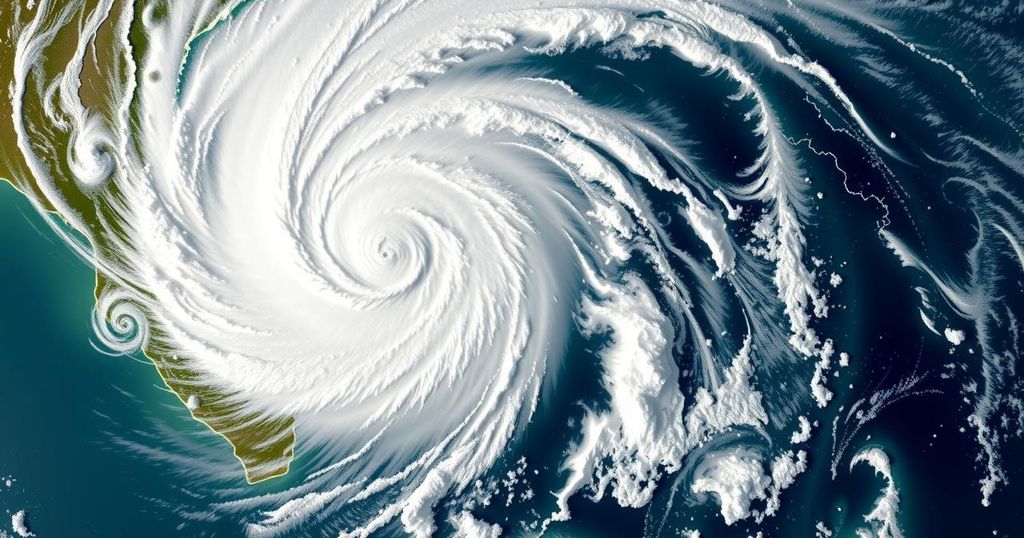World news
AFRICA, BRUNO RETAILLEAU, CHI, CNN, EMERGENCY RESPONSE, EMMANUEL MACRON, EUROPE, FRANCE, FRANCOIS BAYROU, FRANCOIS DUROVRAY, FRENCH INTERIOR MINISTRY, INDIAN OCEAN, INTERIOR MINISTRY, MAYOTTE, MOZAMBIQUE, NATURAL DISASTER, NATURAL DISASTERS, OLYMPIC GAMES SECURITY, PARIS, REUNION, WEATHER SERVICE
David O'Sullivan
0 Comments
Cyclone Chido Devastates Mayotte, Threatens Africa’s East Coast
Cyclone Chido has caused extensive damage and fatalities in Mayotte, with predictions of its impact extending to Mozambique and surrounding regions. French officials have mobilized emergency resources and personnel to assist in recovery efforts as the cyclone progresses toward the African mainland. The storm exemplifies the increasing severity of cyclones due to climate change, particularly affecting impoverished nations like Mayotte, which are unprepared for such disasters.
Cyclone Chido has wreaked havoc across the French territory of Mayotte in the Indian Ocean, leading to multiple fatalities, according to officials. As the cyclone intensifies, it is now projected to impact Africa’s eastern coast. French Interior Minister Bruno Retailleau stated that although a preliminary death toll indicates that several individuals have died, an accurate assessment remains pending due to rescue operations still being underway on the ground. “The island seems devastated,” he remarked during an emergency meeting.
With wind speeds exceeding 220 kilometers per hour (136 mph), Cyclone Chido has caused extensive damage, tearing roofs from homes in Mayotte, which is home to over 300,000 residents residing on two primary islands approximately 800 kilometers off the coast of Mozambique. Prime Minister François Bayrou reported that critical public infrastructure, including the hospital, airport, and prefecture, has sustained severe damage. Additionally, those living in makeshift structures are particularly at risk.
French President Emmanuel Macron is closely monitoring the unfolding situation. Mayotte’s prefect François-Xavier Bieuville emphasized the cyclone’s unprecedented severity since 1934, noting that many residents have lost everything. The French government has deployed 1,600 police and gendarmerie officers to assist displaced individuals and deter looting. Moreover, 110 rescuers and firefighters from mainland France and Réunion have been dispatched to aid recovery efforts, with plans for an additional 140 personnel.
Mayotte, recognized as France’s poorest territory, has previously experienced challenges such as drought and underfunding. Transport Minister François Durovray disclosed that the local airport suffered severe damage, particularly to its control tower, and flights will initially resume only for military purposes. Local authorities continue to urge residents to remain indoors in secure shelters as emergency services handle the critical conditions.
The island of Comoros, situated north of Mayotte, is facing similar challenges with residents being warned of the cyclone’s approach; authorities have expressed concern for a group of fishermen who have been unaccounted for since their outing. Comoros is implementing heightened security measures, including mandating ships to remain in dock and closing airports and schools in preparation for the storm.
Chido is expected to traverse eastward towards Mozambique, potentially affecting 2.5 million people across the northern provinces of Cabo Delgado and Nampula. Regions such as Malawi and Zimbabwe are also preparing for the cyclone’s impact, with Malawian authorities advising the relocation of residents from flood-prone areas. The cyclone season in southeastern Africa runs from December to March, with recent years witnessing increasingly severe storms, prompting concerns regarding the humanitarian impact due to climate change-induced intensification of such weather phenomena.
The current cyclone season in the southeastern Indian Ocean spans from December through March, with the region having suffered from a series of devastating storms in recent years. Notably, Cyclone Idai in 2019 resulted in over 1,300 fatalities across Mozambique, Malawi, and Zimbabwe, while Cyclone Freddy claimed more than 1,000 lives just last year. These storms not only pose immediate risks of flooding and landslides but can also lead to longer-term health crises, such as outbreaks of cholera, dengue fever, and malaria due to stagnant water. Such phenomena have been worsened by climate change, disproportionately impacting impoverished nations in southern Africa that contribute minimally to global climate change emissions.
In summary, Cyclone Chido has resulted in significant destruction and loss of life in Mayotte and poses an imminent threat to neighboring regions in Africa. As local authorities work tirelessly to assess damage and support affected populations, the historical context and the exacerbating effects of climate change underscore the pressing need for comprehensive disaster preparedness and response strategies in vulnerable areas. The adverse socio-economic impacts further highlight the disparity faced by nations ill-equipped to handle such crises.
Original Source: www.cnn.com




Post Comment